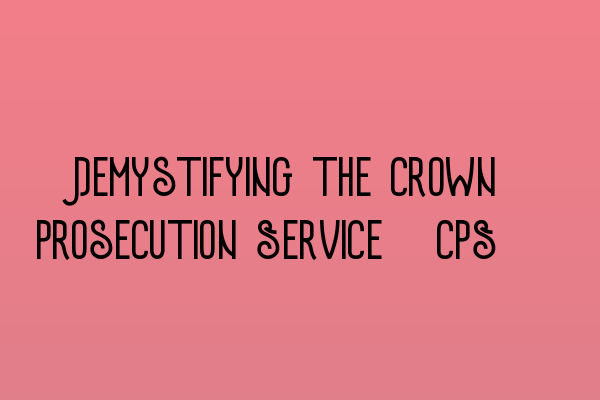Demystifying the Crown Prosecution Service (CPS)
When it comes to criminal law in the UK, one of the most important institutions is the Crown Prosecution Service (CPS). The CPS is responsible for prosecuting criminal cases on behalf of the state. Understanding the role and functions of the CPS is essential for any aspiring solicitor or legal professional. In this article, we will demystify the CPS and shed light on its key responsibilities, structure, and processes.
What is the Crown Prosecution Service (CPS)?
The Crown Prosecution Service (CPS) is an independent body that operates in England and Wales. Its main function is to decide whether to prosecute people who have been accused of a criminal offense and to conduct those prosecutions in court. The CPS works closely with the police and other law enforcement agencies to ensure that justice is served.
They have a critical role in the criminal justice system, as their decisions can significantly impact the lives of individuals and society as a whole. The CPS must adhere to the Code for Crown Prosecutors, which sets out guidelines on how to handle cases and make fair and impartial decisions.
Structure of the CPS
The CPS is headed by the Director of Public Prosecutions (DPP), who is appointed by the Attorney General. Beneath the DPP, there are Chief Crown Prosecutors (CCPs) for different regions of England and Wales. These CCPs oversee the casework and operations of their respective areas.
Furthermore, within each region, there are teams of lawyers, paralegals, and support staff who handle the day-to-day caseload. These teams work closely with the police, gathering evidence, preparing cases, and representing the prosecution in court.
The Role of the CPS
The primary role of the CPS is to make fair and informed decisions about whether a person should be charged with a criminal offense and, if so, to conduct the prosecution effectively. They are responsible for reviewing the evidence provided by the police and other agencies to determine if there is enough evidence to proceed with a criminal case.
The CPS must also consider whether it is in the public interest to prosecute. This involves considering factors such as the seriousness of the offense, the harm caused to the victim and society, and the likelihood of a successful prosecution. They must weigh these factors against any potential defense or mitigating circumstances that may arise.
Once a decision to prosecute has been made, the CPS assumes responsibility for preparing and presenting the case in court. They work closely with the police to gather further evidence, interview witnesses, and engage in legal research to strengthen their case. During the trial, CPS lawyers present the evidence and arguments to prove the guilt of the accused.
Key Processes and Stages
Understanding the key processes and stages involved in a CPS case is crucial for solicitors and legal professionals. Let’s briefly outline the main steps:
- Investigation: The police and other law enforcement agencies investigate the alleged offense and gather evidence.
- Charging Decision: The police hand over the evidence to the CPS, who then evaluate whether there is enough evidence and it is in the public interest to proceed with a prosecution.
- Preparation: If the decision is made to prosecute, the CPS works to gather additional evidence, interview witnesses, and prepare their case for trial.
- Disclosure: The CPS is responsible for disclosing all relevant evidence to the defense, ensuring a fair trial.
- Trial: The CPS presents the case in court, calling witnesses, cross-examining the defense, and making legal arguments to support the prosecution.
- Verdict: The jury or judge determines the guilt or innocence of the accused based on the evidence presented.
- Sentencing: If a guilty verdict is reached, the CPS may provide input on the appropriate sentence, advocating for the interests of the victim and society.
Throughout these stages, the CPS must uphold the principles of fairness, justice, and equality before the law.
Why is it Important to Understand the CPS?
Aspiring solicitors and legal professionals need to understand the inner workings of the CPS for several reasons:
- Effective communication and collaboration: Solicitors often work closely with the CPS, providing them with instructions, evidence, and legal arguments. Understanding how the CPS operates allows for efficient communication and collaboration.
- Strategic decision-making: Understanding the CPS’s approach and decision-making criteria can help solicitors make informed decisions on how to best represent their clients’ interests.
- Ensuring a fair trial: Understanding the CPS’s responsibilities in disclosing evidence and presenting a case in court is crucial for solicitors in their pursuit of justice and protecting their clients’ rights.
In conclusion, the Crown Prosecution Service (CPS) plays a vital role in the criminal justice system in England and Wales. Understanding how it operates, its responsibilities, and its decision-making processes is essential for aspiring solicitors and legal professionals. By demystifying the CPS and shedding light on its inner workings, we hope to provide valuable insights into this important institution.
If you’d like to learn more about becoming a solicitor or the SQE exam, check out our related articles:
- SQE Exam Prep: Essential Study Materials for Aspiring Solicitors
- Demystifying the Solicitors Qualifying Examination Format
- SQE Exam for International Lawyers: Challenges and Success Strategies
- LLC Formation Made Simple: Step-by-Step Guide for UK Entrepreneurs
- LLC Formation: A Step-by-Step Guide for UK Entrepreneurs
